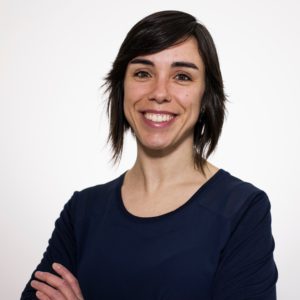 |
Vera Novais, |
 |
Vera Novais, |
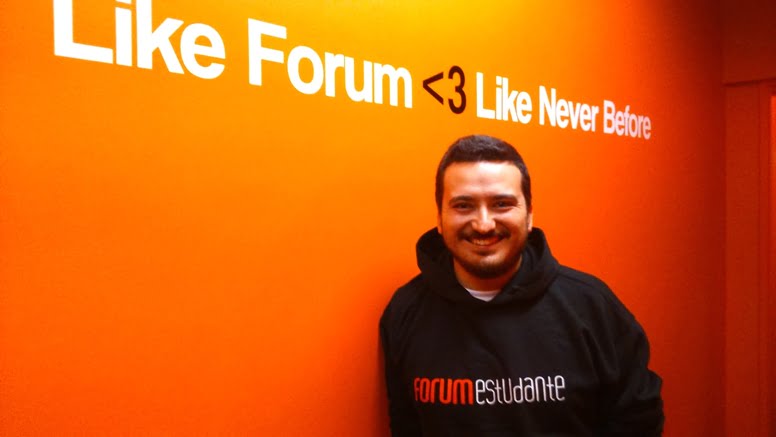 |
José Maria Archer, |
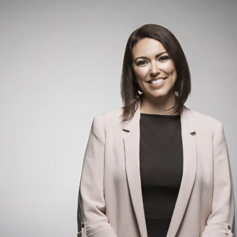 |
Fernanda Freitas;
|
Nuno Ramos Vieira cria, produz e realiza projectos pedagógicos de prevenção, investindo em novas formas de comunicação para atingir os objectivos pretendidos.
É formador quando o público motiva e autor quando o tema instiga.
Nos últimos anos o realizador veste a pele do actor e abraça Super S, um “moderador palestrante” que leva exemplos concretos e adequados às crianças para compreenderem e adoptarem hábitos que prolonguem a vida e evitem doenças.
Mostra, reflecte, questiona e implementa através da arte, utilizando o vídeo e a música como elo de ligação.
The Young Reporters for the Environment annual National Operators Meeting (NOM) took place in Guimarães from 17th to the 18th of February, counting with the presence of 29 different nationalities focusing on “sharing our ideas, challenges and opportunities” as stated by Lesley Jones, President of FEE.
Young Reporters for the Environment Project
The YRE project developed by Foundation of Environmental Education (FEE) operates in 34 countries and since it was officially established in 1994. This project challenges youngsters to investigate, connect, finding solutions, report and getting through to people in general what is happening locally, spreading the message using the media. Working on the same framework the young reporters write and make videos regarding themes as climate change, litter production, resource consumption and scarcity, agriculture and biodiversity or any other related to the environment.
NOM: the agenda
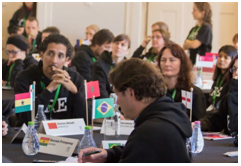
Fig. 1 – Discussions at the Sessions during the NOM
The National Operators Meeting promotes the communication between National Operators of the YRE project, being a “wonderful opportunity to work on the same goal and to share thoughts and opportunities”, according to Lesley Jones. This year NOM targeted discussing on how to strengthen YRE as a program and to create possible partnerships. What is more it was also debated how to reach more countries, whether to increase the age window up to 25 years old, if it was positive to fit the project in educational systems and the importance of professional development of National Operators and teachers. Moreover one of the main points in discussion was whether or not to extend YRE program field of work to all sustainable related topics.
Besides the discussion sessions, the program included the presentation of several Portuguese school projects and also counted with diverse participations from organizations such as UNESCO (Portugal) to political related speakers for instance Domingos Bragança, Mayor of Guimarães and Augusto Serrano, representative of the Portuguese Agency for the Environment (APA). The participants also had the opportunity to discover the city, its culture and the Portuguese gastronomy.
Why in Guimarães?
Being held in different countries every year, 2017 was the year for Guimarães a city linked to the foundation of the Portuguese national identity, recognized by its beauty and historical value by UNESCO in 2001.
“Sharing the history, science and good practices are key aspects to protect the environment.”, affirmed the Mayor of Guimarães. Bearing this in mind the municipality applied for the award of European Green Capital 2020. In order to achieve this several projects have been promoted in the city. One of these included teaching children on how to ride a bike so they could familiarize themselves with this eco-friendly mean of transport (EducaBiclas). Although, not focusing in only one theme, approaches to reduce urbane solid residues (Eco-pontas and Papa-Chicletes) and to increase forest area in the region (Guimarães mais floresta).
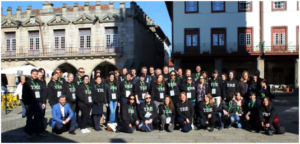
Fig. 2 – National Operators at the NOM 2017 in Guimarães
“At the NOM people travel, meet, debate, experiment, share and at the same time have fun”, stated José Archer, President of ABAE, during the Opening Session. All in all that is the whole point of a National Operator Meeting where National Operators of several different countries argue about how to increase the success of the Young Reporters for the Environment Project.
All the national operators are committed to make the YRE a more appealing and successful program. Will that involve changing the range of topics of investigation by YRE? Will he have 25 year old YRE’s? Will teachers more prepared to instruct their students about YRE? How will the number of YRE’s increase?
Portuguese YRE at the NOM 2017
Joana Pedro, Luís Dias, Ruben Pereira, Sara Cascais
The Foundation for Environmental Education (FEE) main mission is “to engage and empower people through education in collaboration with our members and partners worldwide”. With efficiency, dedication and incredible ability since 1980, FEE reaches people and raises awareness about the need of being environmentally educated and having an eco-friendly attitude.
In order to achieve the 17 sustainable goals, ensuring the compliance with the organizations and partners and recommending policies/plans to act, FEE focuses on programs, such as Young Reporters for the Environment, Eco-Schools, Blue Flag, Green Key and Learning about forests that make the difference every day.
This year in NOM some personalities from the foundation were present and shared what it is like to work in FEE and make it successful: Lesley Jones, the president of FEE; Boris Susmak, Young Reporters for the Environment Board Director; Malgorzata Luszczek, International YRE Director.
From all the projects developed by FEE which one has shown to reach more people and has been more successful over the last years?
The President of FEE answered that “in terms of reach to people I think we would have to say Eco-Schools that is a well established program that has been around for nearly 25 years and that now reaches over 50 million students across the world, in 60 different countries. So it is a success because the more young people we can reach the bigger difference we can make. Also, the other programs are reaching different audiences in a way so if we are talking about blue flag that reaches people in the municipalities and visitors and our green key program reaches out people in the hotel sector. But I don’t want to forget our very important maybe slightly smaller programs because they are growing all the time. YRE is a fantastic program in terms of reaching older students and it gives freedom and flexibility for young people to choose the way they want to use that passion for an issue that matters to them. And I must mention our fifth program that is Learning about Forests that has a very niche place and everything about it focusing in biodiversity with an important cultural and even economic value of the forest, so that’s a very important learning program as well”.
Do you think environmental education is working on the perspective that kids learn about these issues at school and share it with their friends and family? And how is the family feedback?
“The family feedback is incredibly important. Young people are such an important starting point because they are the future but we mustn’t just look to the future; we need to think about what we are doing now as well because it has impact in the future but also in the present. So I think the feedback you get from acknowledgement you can get through schools, organizations and through FEE programs is very important as well as sharing it” stated Lesley Jones.
To maintain the project and to make it successful what is the main challenge you faced?
“The Main challenge is always the limited budget we have, because we can have a lot of dreams and ideas that we want to implement but sometimes we don‘t have enough resources. But if you have good ideas and if people like to do it we can do the activity even if there aren’t enough resources” affirmed Malgorzata.
How important do you think it is to reach Universities with projects such as YRE and Eco-Schools?
“I think it is very important to try to have continuity and there already are some very strong Eco-Campus around the world. Actually, were the students who said that wanted something like Eco-Schools at Universities. The students themselves influenced the structure, the institution and the management of the university. One of FEE objectives is to support the development of Eco-Campus and reach students through the YRE program. Developing this in Universities is an opportunity for students to change behaviors and take action as they are older and more mature” asserted Lesley Jones.
Most of the countries involved in YRE project are from Europe, how do you think cultural and political barriers influence the participation of more countries from different continents?
The President of FEE believes that “every country has different challenges and different opportunities, and I think partly there are more countries in Europe because FEE started in Europe and so there hasn’t been much time for the projects to develop globally. I think some countries have more challenges; maybe the countries from the developing world that for not having NGO’s that are able to start the program so easy, so the starting point would be for a NGO to be developed first. Obviously, we have talked today about the importance of funding and finances, so that can be a challenge and a barrier to find the resources, the expertise and the skills. I believe the program now has grown very significantly over the last few years, reaching more countries and more young people. We have to recognize diversity, we have to recognize culture diversity and we have to celebrate it”.
Do you think it is becoming harder and harder to discuss environmental issues bearing in mind recent political changes?
“The choices, the presidents that changed in the USA and in other countries and people as well led to more restrict decisions and that might affect global issues and discussions about sustainable development, including the decisions we are taking. I think that climate change resolutions made a few years ago gave a step back. It is our role not to let it happen” said the international YRE director.
What are the most important aspects of this National Operators Meeting?
Gosia answered: “From this meeting my biggest expectation is related to education for sustainable development, taking YRE from the field that has been focusing on and expand it to others based on different issues such as social and economical. And for this we will discuss it with the national operators so to involve students in the program that are interested to write about poverty, gender equalities and other aspects. I think that all these discussions we have till now gave us a lot of good ideas to develop the program. Hopefully on the next NOM we will review all these decisions we are taking today and we will see what the best way to achieve success is.”
Here in Portugal we have special seminars for teachers to instruct them on how to produce a video and how to write articles. Does it happen in other countries? Do you consider it important?
“This experience and this know-how that you have is crucial and all other countries should copy because it is really amazing and results are definitely awesome, since it is what we need in this particular program” sentenced Boris Susmak.
What do you expect from your new position as YRE Board Director?
Boris claimed that “definitely I will add as many energy as possible to this NOM and in other activities. We are Young Reporters for the Environment, have to feel like that so we have to feel energetic and try to motivate others that are listening, reading or looking into our results”.
What is your personal motivation to be the president of FEE?
“When I become a part of FEE I found straight away that passion of being a part of a world movement and to learn about the way people do things and the challenges they have in their cultures and lifestyles. I think that opportunity to be part of the world through FEE is a really good motivation. As part of my responsibilities I have to make sure FEE itself is a strong and sustainable organization and pass the message to different countries” answered Lesley Jones.
If you had to describe FEE in one sentence, how would you do it?
“FEE is a Remarkable family that talks about taking action to bring about an important change” asserted Lesley Jones.
Portuguese YRE at the NOM 2017:
Joana Pedro, Luís Dias, Ruben Pereira, Sara Cascais
“A new national strategy of environmental education defines a number of priority themes to be worked on annually.”, asserted Augusto Serrano representative of the Portuguese Environment Agency (APA) at the YRE National Operators Meeting, in Guimarães.
APA is a public institution created in 2012 administrated by the Portuguese Ministry of the Environment, Territory Management and Energy, even though having financial and conduct autonomy. It aims to propose, develop and monitor sustainable development policies “together with other public and private institutions to reach the same aim” as explained by Augusto Serrano during a quick interview at the NOM.
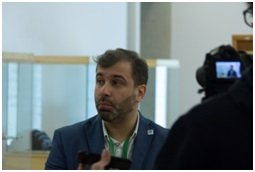
Augusto Serrano from the Portuguese Environment Agency (APA).
He disclosed that the institution pursues a high level of protection and appreciation for the environment also playing an important role in the assurance of environmental education, involving the population. Moreover, APA also plays a role in creating strategies to spread information and supporting national NGO’s, being some of them ABAE, Quercus, GEOTA and FAPAS. However he claims that “since it is a continuous work it might not be that visible for the majority of the citizens. In fact, I believe of environmental related issues and themes are mainly only visible, by people, when they are negative. Nonetheless since the agency resulted from the fusion of different entities we are still learning a new way to put into practice some of our policies.” Veritably APA summarizes purposes and efforts initially taken up by 6 different public institutions and commissions. This results in a more efficient coordination and resource management which is a consequence of the harmonized and simplified procedures.
“In fact there is a lot of investment and great development in environmental education, in Portugal, for example by the municipalities in cooperation with schools. There’s not a lack of environmental education, in great part due to ECO XXI that connects to Eco-Schools since schools need municipalities and vice-versa.”, avowed Augusto bearing in mind that environmental education is a focal point for APA. Being cognizant of that, there is a partnership established with the Ministry of Education that makes it easier to recruit teachers to develop projects focusing on this.
Augusto also set forth that “We support every ABAE program, especially Eco-Schools which involves a huge number of youngsters in Portugal. Nevertheless we mustn’t forget that we need everyone, every generation, because in this moment the problem is not only for the future generations, it’s an issue in the present”, emphasizing the importance of improving the knowledge and information about the environment in all levels of society, reinforcing public participation. After all “This necessity of gaining knowledge about the environment to reach environmental goals at an European level. We have to transmit and reach people about what’s really at stake because if we don’t, we won’t reach the finish line. And that was the motto to create a national strategy of environmental education for the diverse areas of interest.”
All in all, the Portuguese Environment Agency acting in different areas related to the environment, through a handful of various procedures, that even if often not visible nowadays, will hopefully be in a near future. Augusto Serrano made preeminent that “the cooperation between ONG’s and private enterprises and organizations is essential. That was the focal point to the formation of the national strategy of environmental education which despite having been created at the ministry it is not intended to serve the ministry itself, but the people in our communities.”
Portuguese YRE at the NOM 2017
Joana Pedro, Luís Dias, Ruben Pereira, Sara Cascais
Born in the Republic of Zimbabwe, in Harare (1967)
Degree in International Relations (University Lusíada, Lisbon, 1991)
Master in Environmental Citizenship and Participation with the master thesis “Earth Sciences for Society – The International Year of Planet Earth: Impacts and Changes in Portugal” (2012); PhD student in Geography (Environment and Natural Resources), at the University Nova of Lisbon (2015/2017)
Since 1994:
Responsible for the Science Sector – Natural and Exact Sciences and Human and Social Sciences – of the Portuguese National Commission for UNESCO, Ministry of Foreign Affairs, in Lisbon;
1994 – 2000:
Program Specialist of the Portuguese National Committee for the Intergovernmental Oceanographic Commission (IOC) created under the aegis of the Portuguese National Commission for UNESCO – Ministry of Foreign Affairs, promoting projects at a national and international level and coordinating activities related with marine research, capacity development, ocean and coastal areas;
2002 – 2005:
Since 2005:
Focal Point for the United Nations Decade of Education for Sustainable Development (2005-2014) and responsible for the coordination of the National Platform Education for Sustainable Development 2014+, following the UNESCO strategy based in the Global Action Program on Education for Sustainable Development and the 2030 Development Agenda;
Since 2007:
Member of different Scientific Councils, in the framework of the International Years and Decades proclaimed by the United Nations and supported by UNESCO: Planet Earth (2007-2009), Astronomy (2009), Biodiversity (2010), Chemistry (2011); Forests (2011), Mathematics of Planet Earth (2013), Crystallography (2014), Light (2015) and Soils (2015), Global Understanding (2016);
Author and co-author of several scientific articles (Episodes, Lyell Collection, etc.) and scientific papers;
Participation in TV documentaries and programs including radio programs and collaboration with newspapers magazines and interviews, children books, National Magazine of Stamp Collectors, during the International Year of Crystallography / Light (IYL) and Soils (IYS) and co-responsible for the creation of the respective postage stamps;
Since 2011:
Member of the Portuguese National Committee for the International Geosciences Program of UNESCO (IGCP);
Coordinator of the Portuguese National Forum of Geoparks. In this field, since 2006, has participated in all European Conferences of Geoparks (and also in the Global Conference, held in Canada, in 2014);
Representative of the Global Geoparks Network (GGN) to UNESCO Headquarters, for diplomatic meetings with the Permanent Delegations of the Member States with a seat at the Executive Council of UNESCO, to explain the importance of the creation of a UNESCO Scientific Program dedicated to Geoparks (2013);
Member of the Working Group created by the Director-General of UNESCO with the task to create the guidelines and statutes of the proposed “International Geosciences and Geoparks Program” (IGGP) and especial contribution to the creation of the statutes and guidelines of the new Program “Global Geoparks of UNESCO” (2013/2015);
Coordinator of the Portuguese National Network of Biosphere Reserves;
Member of the Portuguese National Committee for the Program “Man and Biosphere” (MAB);
Member of the Portuguese Committee for Mathematics of Planet Earth;
Member of the Coordination Committee of the UNESCO Chair “Geoparks, Sustainable Regional Development and Healthy Lifestyles” held by the Portuguese University of Trás-os-Montes and Alto Douro (Vila Real, Portugal), with a especial scope regarding capacity building in African Portuguese Speaking Countries and Latin America and Caribbean Countries;
Member of the Executive Committee of the Regional Section (Portugal-Spain) of the International Year of Global Understanding (2016);
Commendations/ Awards:
2015 | Praise given by the Assistant Director-General for Natural Sciences of UNESCO (Flávia Schlegel) for the invaluable contribution to realizing the “International Geosciences and Geoparks Program” (IGGP) and the creation of the new designation of “UNESCO Global Geopark”;
2014 | Commendation given by the State Government of Ceará and Regional University of Cariri – URCA and Araripe Global Geopark of UNESCO for the outstanding services and efforts voluntary dedicated to the Araripe Geopark in the promotion of the Educational Program “GEA – Mother Earth”, State of Ceará, Brazil;
2010 | Commendation given by the International Astronomical Union in recognition of the performance and outstanding contribute to the success of the International Year of Astronomy (2009), in Portugal;
2009 | Award given by the International Corporation IUGS-UNESCO to the Portuguese National Committee for the International Year of Planet Earth for the outstanding performance and contribution to the motto “Geosciences at the service of Society”.
Maria Ana Neves is an Associate Member of Help Images, a Fellow of The RSA (Royal Society of the Arts) and SSE – School of Social Entrepreneurs.
Professionally she is a Design Strategist, Associate Lecturer at the University of the Arts (UAL) – Central St Martins – school of design (London) and an expert in Innovation Management with a major interest in social and environmental challenges. Over the last 15 years, she lived in London where she took part in various initiatives to designing-out waste, projects include co-founding Plan Zheroes, the first hybrid of a citizens movement and new technology platform to end Food Waste and Food Poverty in London.